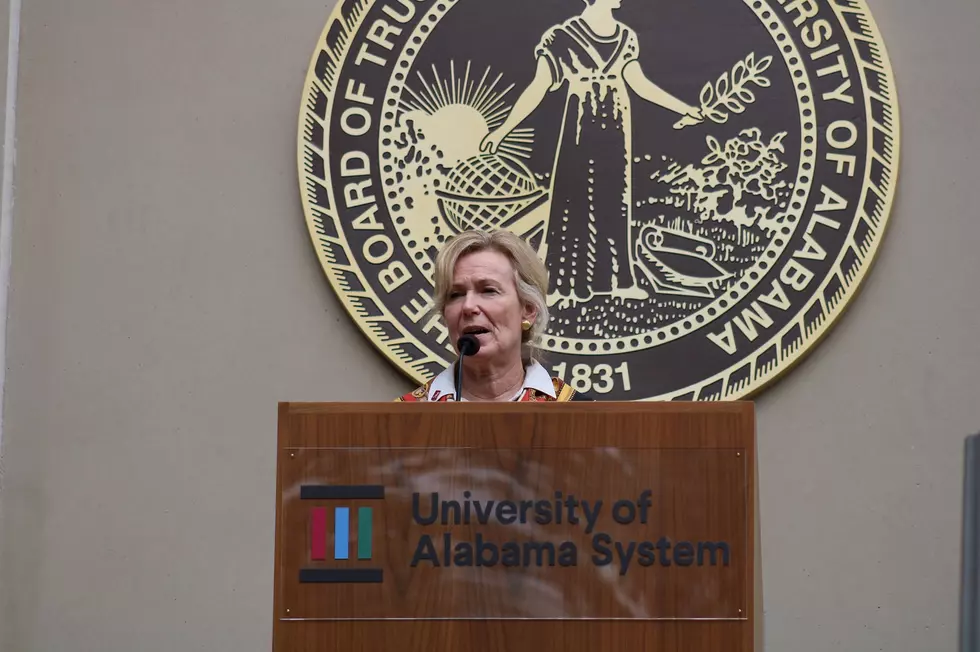
Birx Gives UA ‘An Extraordinarily High Grade’ for COVID Response
Dr. Deborah Birx, the White House Coronavirus Response Coordinator, visited the University of Alabama in Tuscaloosa Friday and praised its administration's efforts to combat and contain COVID-19 on campus.
Birx said she has been driving around America since the end of June, meeting with community leaders to discuss the pandemic in their area, evaluate their response to it and study best practices she can bring to other communities in the US.
On her agenda this week are trips to SEC Universities, where Birx is meeting with administrators, local government leaders and members of the student bodies to learn more about the coronavirus on college campuses.
Birx praised the Capstone for its extensive back-to-school plan, their willingness to adapt and evolve as circumstances demand, and especially for the administration's commitment to working with local officials like Tuscaloosa Mayor Walt Maddox and student leaders from the SGA and Greek organizations to attack the virus from a united front.
"What we've seen in really successful institutions like the University of Alabama is a real coalition between students, the administration and the community all working together and following a single goal with 100 percent buy-in," Birx said Friday. "For that kind of coalition, I would give them an extraordinarily high grade."

Birx did say the University has room to improve on the testing side -- even though each student in Tuscaloosa was tested for COVID-19 before returning, all symptomatic students are tested and sentinel testing of random students, faculty and staff is underway.
"I always want to see more tests," she said. "When you're looking for asymptomatic disease it's impossible to find people who don't have any symptoms and look well without testing, so we talked about their ability to conduct surge testing and I'm quite confident they have the ability to not only do the tests they're doing today with surveillance and diagnosing those who are exposed but also where surge testing is needed."
Birx said though cases may have spiked on campus in the first few weeks of classes, after reviewing data and talking with both administrators and student leaders, she believes UA's nearly 40,000 students understand the virus and their role in combatting it much better than they did in August.
"It's very difficult for students who have an expectation, particularly the incoming sophomore, junior and senior classes who have an expectation of what college life was and would be when they return to campus," Birx said. "What we've seen here over the last two weeks is leadership at the student level, leadership at the Greek level and everyone really coming together to really make sure students understood the importance of protecting themselves and making sure they were social distancing and wearing a mask and wearing their hands and protecting others."
Birx said students who may have thought they were invincible now realize that becoming COVID-positive could have far-reaching effects.
"They really understood, after that first week or two, that the consequences of becoming positive were far greater than their individual consequences of maybe feeling a very mild disease" "It could be transmitted to others who would then transmit to others and eventually hit a parent or a grandparent or an aunt or uncle."
Asked about the future of college football and if she believed the University had a good plan in place for fans to return to Bryant-Denny Stadium, Birx said she would need more details before saying one way or the other.
"We've had very specific recommendations about social distancing and what that will entail, social distancing not only in the stadium itself but social distancing in entering the stadium, social distancing for facilities and use of bathrooms in the stadium," Birx said. "I haven't seen those plans so it's impossible for me to answer, but each of those components needs to be taken into account. You have to not only protect people while they're in their seats but when they get up and need to go to the bathroom, when they're entering and exiting. At a minimum, people need to ensure they're wearing a mask to protect themselves and protect others."
Birx said she and her entourage drive around the country instead of flying from destination to destination because she wants a real sense of what America is doing in its gas stations and coffee shops and restaurants as people go about their everyday lives.
She said she was mostly encouraged by what she has seen in the Yellowhammer State, but said more of the state's men need to be wearing masks and social distancing.
"What we saw is a lot of women wearing masks, but not all the men of Alabama wearing masks," Birx said. "If I could just remind the men of Alabama, you get this disease as much as anyone else."
Ultimately Birx's view is one of cautious optimism. She used herself as an example of a person who remains extremely active and interacts with dozens of people daily, but has never tested positive for the virus.
"I went out to dinner last night, I go to coffee shops, I've stayed in hotels, I've been on the road since June 30th and I've stayed negative," she said. "It is possible to be out and about and protect yourself and protect others."
The University of Alabama is releasing data about the number of COVID-19 cases on its campus once per week, and a new round of numbers is expected later Friday afternoon.
“What I think you are going to hear a little bit later from our release is that the testing is working," the University of Alabama President Stuart Bell said. "I could not be more proud of our students, certainly the way that they interacted today would make all of you in the community feel very good about the type of student that comes to the University of Alabama, but more than that how they see this community is being an important part of their life and protecting the community in the way that they are behaving.”
Watch the full press conference with Dr. Deborah Birx below.
More From Tuscaloosa Thread









